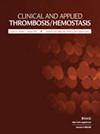阿哌沙班(ZyQuis)在静脉血栓栓塞和心房颤动中的抗 Xa 监测
IF 2
4区 医学
Q2 HEMATOLOGY
引用次数: 0
摘要
阿哌沙班是一种直接口服 Xa 抑制剂,适用于治疗静脉血栓栓塞(VTE)和预防心房颤动(AF)患者中风。最近,一种仿制药(ZyQuis,Zydus Lifesciences Limited,印度)获得了美国食品药品管理局的批准。虽然与 Eliquis(英国百时美施贵宝/辉瑞公司)的生物等效性已得到证实,但有必要在医疗实践中接受该药之前对其有效性进行监测。这项前瞻性研究在两家获得认证的实验室对阿哌沙班(ZyQuis)进行了独立评估。参与者从华法林或利伐沙班转为每天服用 5 毫克阿哌沙班,疗程为一个月。早上服药后 3-4 小时测量抗 Xa 峰值水平。样本在 Atellica COAG 360(德国马尔堡,西门子 Healthineers)分析仪上进行处理,并使用色原抗 Xa 分析法(Innovance,参考区间为 69-321 纳克/毫升)。共有 26 名参与者;5 名男性,21 名女性;平均年龄为 46±12 岁。抗凝适应症包括VTE(88.5%)和房颤(11.5%)。69.2%的参与者至少有一种合并症。96.2%的抗 Xa 水平在实验室 95% 的参考区间内。在各实验室测得的平均抗 Xa 活性分别为 191 ± 69 纳克/毫升和 186 ± 68 纳克/毫升。Bland-Altman 统计法显示抗 Xa 测量值的平均差异很小(偏差为-2.6%,95% 置信区间为-1.11 至-4.09),戴明回归分析(0.995)也观察到了很强的相关性。从抗 Xa 活性来看,阿哌沙班(ZyQuis)可有效治疗 VTE 和房颤。本文章由计算机程序翻译,如有差异,请以英文原文为准。
Anti-Xa Monitoring of Apixaban (ZyQuis) in Venous Thrombo-Embolism and Atrial Fibrillation
Apixaban is a direct oral Xa inhibitor and is indicated for the treatment of venous thrombo-embolism (VTE) and prevention of stroke in atrial fibrillation (AF). Recently, a generic (ZyQuis, Zydus Lifesciences Limited, India) has received Food and Drug Administration approval. While bioequivalence has been demonstrated with Eliquis (Bristol-Myers Squibb/Pfizer, UK), it is necessary to monitor its effectiveness prior to acceptance in medical practice. This prospective study independently evaluated Apixaban (ZyQuis) at two accredited laboratories. Participants were converted from Warfarin or Rivaroxaban to Apixaban 5 mg bd for a duration of one month. Peak anti-Xa levels were measured 3-4 h post the morning dose. The samples were processed on the Atellica COAG 360 (Siemens Healthineers, Marburg, Germany) analyzers with a chromogenic anti-Xa assay (Innovance, reference interval 69-321 ng/mL). There were 26 participants; 5 men, 21 women; mean ± standard deviation age of 46 ± 12 years. Indications for anticoagulation included: VTE (88.5%) and AF (11.5%). 69.2% of the participants had at least one comorbidity. 96.2% of the anti-Xa levels were within the laboratory's 95% reference interval. Mean anti-Xa activity was 191 ± 69 ng/mL and 186 ± 68 ng/mL measured at respective laboratories. Mean differences in anti-Xa measurements represented by Bland–Altman statistics were small (bias of −2.6%, 95% confidence interval −1.11 to −4.09) and a strong correlation was observed on Deming regression analysis (0.995). Apixaban (ZyQuis) was effective for the management of VTE and AF as evidenced by anti-Xa activity.
求助全文
通过发布文献求助,成功后即可免费获取论文全文。
去求助
来源期刊
CiteScore
4.40
自引率
3.40%
发文量
150
审稿时长
2 months
期刊介绍:
CATH is a peer-reviewed bi-monthly journal that addresses the practical clinical and laboratory issues involved in managing bleeding and clotting disorders, especially those related to thrombosis, hemostasis, and vascular disorders. CATH covers clinical trials, studies on etiology, pathophysiology, diagnosis and treatment of thrombohemorrhagic disorders.

 求助内容:
求助内容: 应助结果提醒方式:
应助结果提醒方式:


